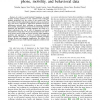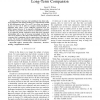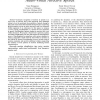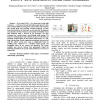102
click to vote
ACII
2015
Springer
9 years 10 months ago
2015
Springer
—In order to model students’ happiness, we apply machine learning methods to data collected from undergrad students monitored over the course of one month each. The data collec...
ACII
2015
Springer
9 years 10 months ago
2015
Springer
Abstract—While it has been well established that affect influences judgments and decision-making, few computational models of the phenomenon exist. The work I have done and prop...
87
Voted
ACII
2015
Springer
9 years 10 months ago
2015
Springer
—Moral judgements are a complex phenomenon that have gained a renewed interest in the research community. Many have proposed explanations for moral judgements, including utilitar...
209
click to vote
ACII
2015
Springer
9 years 10 months ago
2015
Springer
—Previous work on emotion recognition from bodily expressions focused on analysing such expressions in isolation, of individuals or in controlled settings, from a single camera v...
ACII
2015
Springer
9 years 10 months ago
2015
Springer
—Automatic recognition of emotion in speech is an active area of research. One of the important open challenges relates to how the emotional characteristics of speech change in t...
111
click to vote
ACII
2015
Springer
9 years 10 months ago
2015
Springer
Current research in emotion recognition focuses on identifying better feature representations and recognition models. The goal of this project is to improve on current automatic e...
114
Voted
ACII
2015
Springer
9 years 10 months ago
2015
Springer
— We present LISSA – Live Interactive Social Skill Assistance – a web-based system that helps people practice their conversational skills by having short conversations with a...
ACII
2015
Springer
9 years 10 months ago
2015
Springer
—We investigated whether the dynamics of head and facial movements apart from specific facial expressions communicate affect in infants. Age-appropriate tasks were used to elici...
ACII
2015
Springer
9 years 10 months ago
2015
Springer
Abstract—This paper is to show a representation of fundamental frequency (F0) using continuous wavelet transform (CWT) for prosody modeling in emotion conversion. Emotional conve...
ACII
2015
Springer
9 years 10 months ago
2015
Springer
Despite a long history and a large volume of affective research, measuring affective states is still a non-trivial task that is complicated by numerous conceptual and methodologica...






